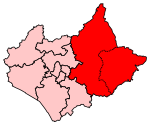Whissendine

Whissendine is a village and civil parish in Rutland, England, north-west of the county town, Oakham. The population at the 2001 census was 1,189, increasing to 1,253 at the 2011 census. The village's name either means 'valley of Hwicce' or 'valley of the people of Hwicci'. Alternatively, perhaps 'valley of the pirates'.It has a pub, The White Lion; a Church of England parish church and a working windmill. The Methodist chapel closed in 2009, the last service being held on 30 August. Whissendine Windmill was built in 1809 and returned to milling in September 2006. The windmill is a Grade II* listed building and is said to be the tallest stone windmill in the country.St Andrew's Church, Whissendine was built in the 13th century and has a 14th-century tower. The screen to the Lady Chapel was brought here from the old chapel of St John's College, Cambridge during the 1870 restoration by George Gilbert Scott. St Andrew's is a Grade I listed building.Whissendine Church of England Primary School is in the middle of the village. The Village Hall hosts many events throughout the year including antiques fairs and the village pantomime. Each year in late June, the village hosts a "feast week", an ancient custom from the Middle Ages that has been reintroduced and entails a week of activities for the community. This includes a 6-mile run, a UK Athletics licensed race, the Feast week extravaganza, the knockout and the fete on the green. The village also has a sports club that has a cricket team, football pitch, tennis club, archery club and a bowling green. The pasture called The Banks is still let by ancient custom. This involves a candle in which a pin is stuck is lit and the last bidder before the pin falls is entitled to rent The Banks for the ensuing year. The village had a scout troop up until 2010 and a cub pack until 2012. The village is on the Rutland Round, the circular walk around Britain's smallest county. In 2019, the parish was the location of an unlicensed rave reported to have been attended by 700 people.
Excerpt from the Wikipedia article Whissendine (License: CC BY-SA 3.0, Authors, Images).Whissendine
Main Street,
Geographical coordinates (GPS) Address Nearby Places Show on map
Geographical coordinates (GPS)
| Latitude | Longitude |
|---|---|
| N 52.72 ° | E -0.771 ° |
Address
Main Street
Main Street
LE15 7ES
England, United Kingdom
Open on Google Maps










